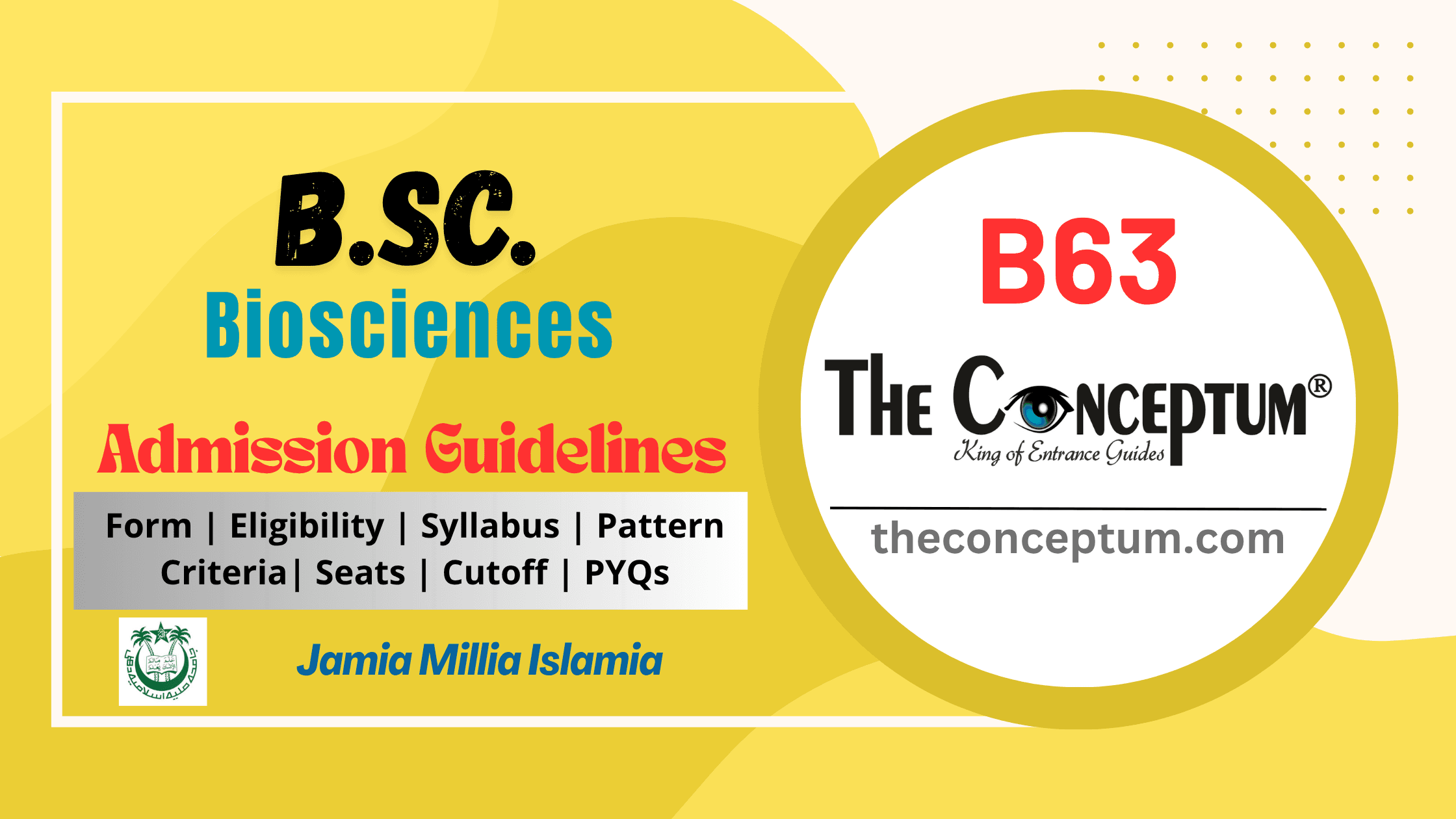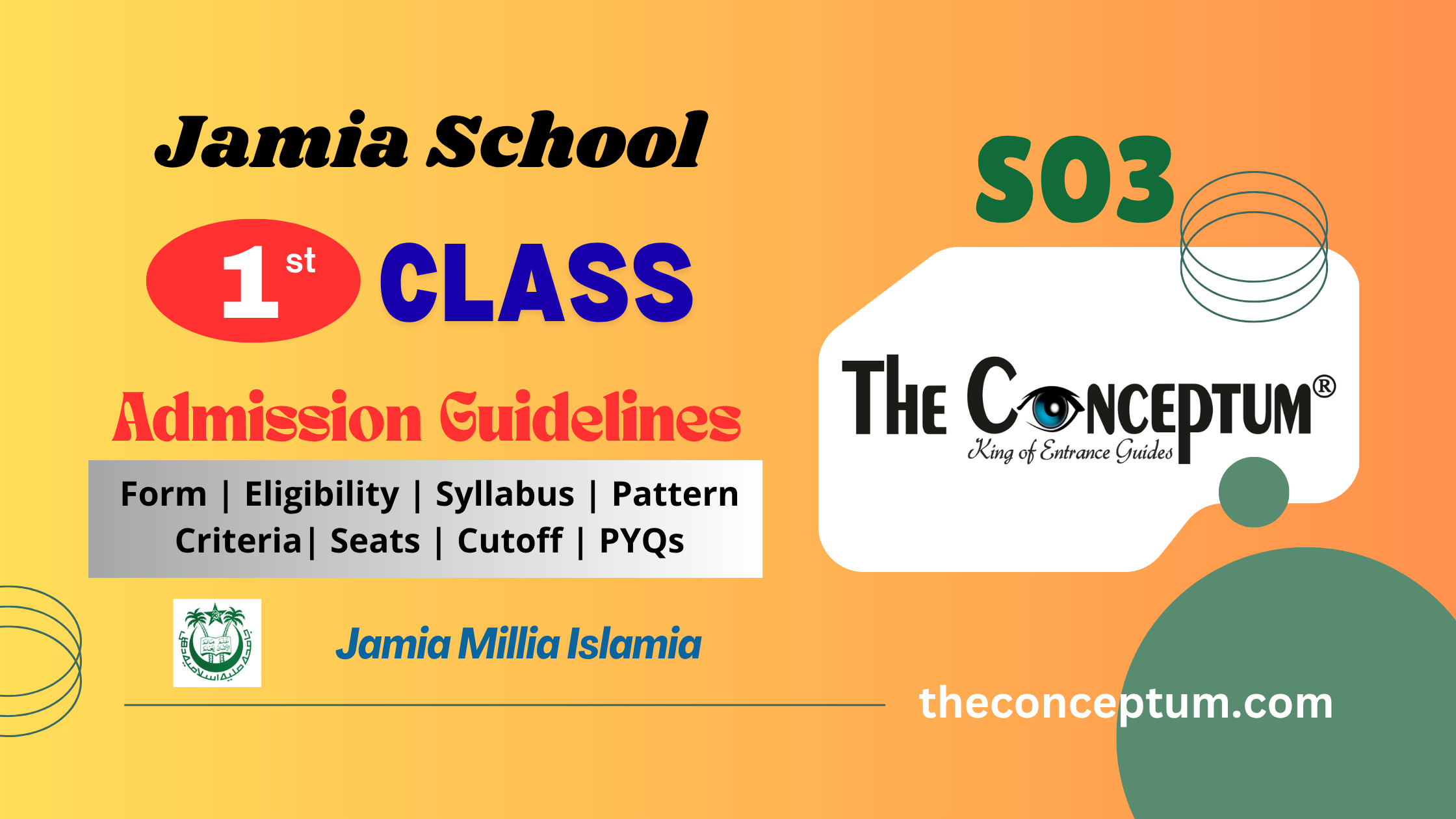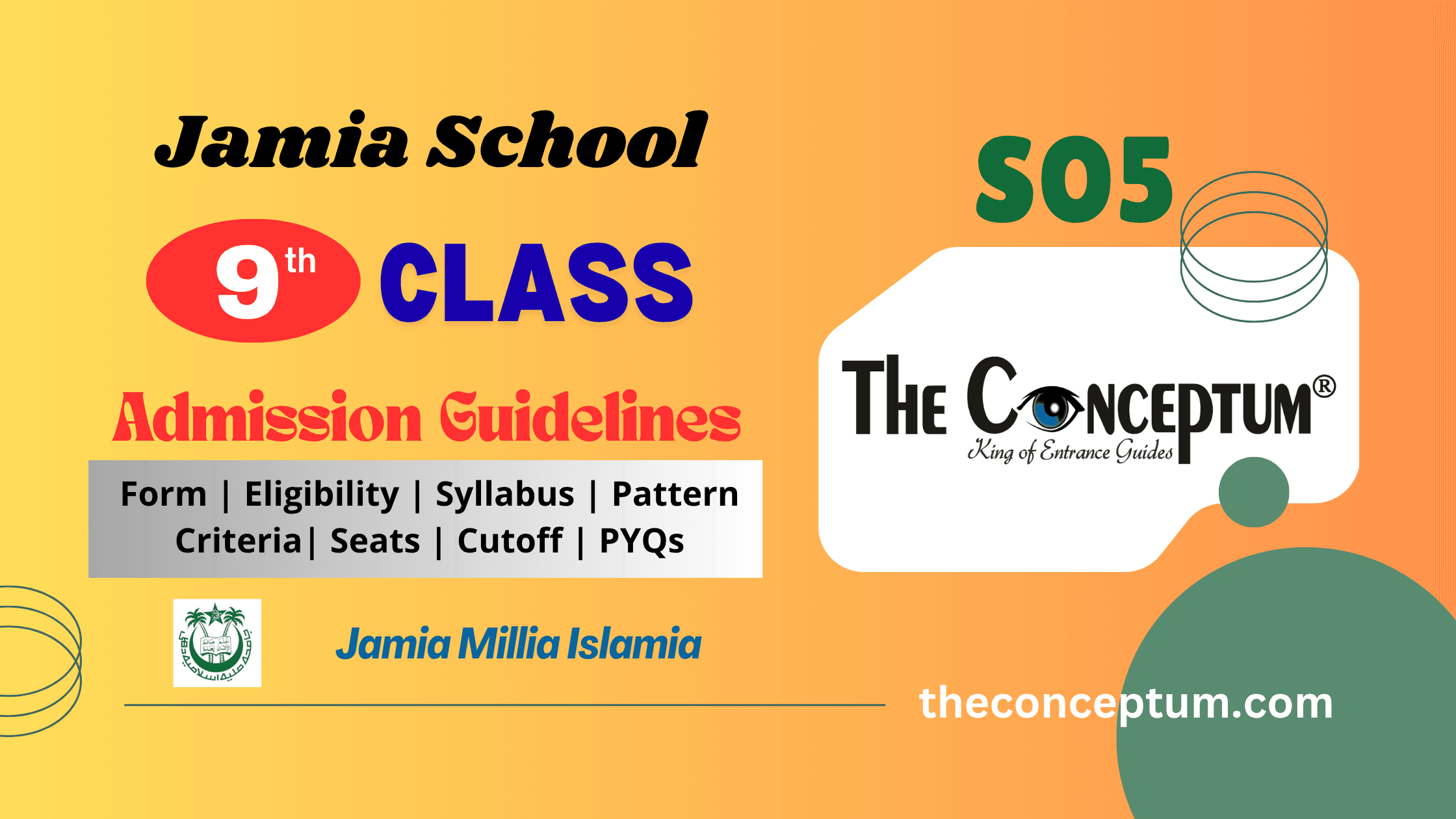
Jamia B.A Hons Economics Guidelines (B59) – Full Admission Details, Cutoff & Syllabus
02/07/2025
Jamia Class 9th Admission Guidelines 2026 | Verified Admission Details (S05)
06/07/2025JMI B.Sc Biosciences Admission Process – Complete Guide 2025–2026
Jamia Millia Islamia, New Delhi – NAAC Accredited Grade ‘A++’
If you’re aspiring to pursue biosciences at one of India’s top central universities, this complete guide on the JMI B.Sc Biosciences Admission Process (Program Code: B63) will help you understand everything — from eligibility and syllabus to cutoffs and required documents.
Programme Overview
| Feature | Details |
|---|---|
| Program Code | B63 |
| Course Name | B.Sc. (Biosciences) |
| Duration | 8 Semesters (4 Years) |
| Seats Available | 40 |
| Annual Fee | ₹10,475 |
| Conducting Faculty | Faculty of Life Sciences |
| Department Website | Department of Biosciences |
| Faculty Website | Faculty of Life Sciences |
Entrance Test Details
| Detail | Information |
|---|---|
| Entrance Test Date | 27 May 2025 (Multi-City Centres) |
| Time | 09:00 A.M. to 10:30 A.M. |
| Result Declaration | Within 20–25 days from the date of exam |
Eligibility Criteria
To apply for the JMI B.Sc Biosciences Admission Process, candidates must meet the following criteria:
- Qualification: Senior Secondary School Certificate (10+2) or equivalent
- Subjects Required: Physics, Chemistry, and Biology/Mathematics
- Minimum Marks: Not less than 50% marks in each of the science subjects (Physics, Chemistry, Biology/Mathematics) individually
Entrance Test Syllabus (as per Chemistry stream model)
The entrance test for JMI B.Sc Biosciences Admission Process broadly follows NCERT Class 11–12 topics in the following areas:
1. Basic Concepts of Chemistry
- Importance and scope of Chemistry
- Laws of chemical combination
- Dalton’s atomic theory
- Concept of elements, atoms, and molecules
- Atomic and molecular masses
- Mole concept and molar mass
- Percentage composition
- Empirical and molecular formula
- Chemical reactions and stoichiometry
2. Structure of Atom
- Discovery of electron, proton, and neutron
- Atomic number, isotopes, isobars
- Thomson’s, Rutherford’s, and Bohr’s models and their limitations
- Concept of shells and subshells
- Dual nature of matter and light
- de Broglie’s equation, Heisenberg uncertainty principle
- Quantum numbers, shapes of s, p, and d orbitals
- Aufbau principle, Pauli exclusion principle, Hund’s rule
- Electronic configuration, stability of orbitals
3. Classification of Elements and Periodicity in Properties
- Modern periodic law and periodic table
- Periodic trends: atomic/ionic radii, ionization enthalpy, electron gain enthalpy, electronegativity, valency
4. Chemical Bonding and Molecular Structure
- Ionic and covalent bonds
- Bond parameters, Lewis structures, resonance
- Geometry via VSEPR theory
- Hybridisation (s, p, d orbitals)
- Molecular orbital theory
- Hydrogen bonding
5. d- and f-Block Elements
- Properties of transition elements
- Trends in ionization enthalpy, oxidation states, radii, colour, catalytic and magnetic properties
- Interstitial compounds, alloys
- K₂Cr₂O₇ and KMnO₄ – preparation and properties
- Lanthanoids and Actinoids – configuration, reactivity, lanthanoid contraction
6. Coordination Compounds
- Ligands, coordination number, colour, magnetism, shape
- Nomenclature, Werner’s theory
- VBT and CFT
- Isomerism
- Importance in biology and industry
7. Chemical Thermodynamics
- System, surroundings, work, heat, energy
- First law: Internal energy, enthalpy, Hess’s law
- Enthalpy changes in various processes
- Second and third law, entropy, Gibb’s energy
8. Chemical and Ionic Equilibrium
- Dynamic equilibrium, law of mass action
- Equilibrium constant, Le Chatelier’s principle
- Acid–base theories, ionisation, pH, buffers
- Solubility product, common ion effect
9. Solutions
- Types and concentration terms
- Raoult’s law
- Colligative properties: vapor pressure, boiling point, freezing point, osmotic pressure
- Van’t Hoff factor
10. Electrochemistry
- Redox reactions, oxidation number
- EMF, electrode potential, Nernst equation
- Conductivity and molar conductance
- Kohlrausch’s law
- Electrolytic and galvanic cells, fuel cells
11. Chemical Kinetics
- Rate of reaction, factors affecting it
- Order, molecularity, rate law
- Integrated rate equations
- Collision theory, activation energy, Arrhenius equation
12. Fundamentals of Organic Chemistry
- IUPAC nomenclature, classification
- Inductive, resonance, hyperconjugation effects
- Reaction types and mechanisms: addition, substitution, free radical
13. Hydrocarbons
- Alkanes: Isomerism, halogenation, combustion
- Alkenes: Geometrical isomerism, electrophilic addition, ozonolysis
- Alkynes: Addition reactions, acidic nature
- Aromatics: Benzene – resonance, electrophilic substitution (nitration, halogenation, etc.)
14. Haloalkanes and Haloarenes
- Nature of C–X bond
- Mechanism of nucleophilic substitution
- Environmental impact of DDT, freons, etc.
15. Alcohols, Phenols and Ethers
- Preparation, properties, uses
- Acidic nature, electrophilic substitution in phenols
- Ethers – physical/chemical properties
16. Aldehydes, Ketones and Carboxylic Acids
- Nomenclature, preparation, physical/chemical properties
- Nucleophilic addition in aldehydes
- Acidity and reactivity
17. Amines
- Classification, preparation, identification
- Basic character and uses
- Diazonium salts and their reactions
18. Biomolecules
- Carbohydrates: Glucose, fructose, starch, cellulose
- Proteins: Amino acids, peptide bonds, denaturation
- Vitamins & Hormones: Basic functions
- Nucleic Acids: DNA and RNA – structure and importance
📝 Note: Exact topics will follow the general syllabus pattern of CBSE/ISC/State Board for Science stream.
Expected Cut-off Trends (Reference from Chemistry Stream B62 – 2025)
| Category | Cut-off Marks (Chemistry) |
|---|---|
| General | 61.75 |
| Muslim | 55.00 |
| Muslim OBC / ST | 49.50 |
| Muslim Women | 52.50 |
| Jamia Internal | 43.75 |
| Jammu & Kashmir | 42.50 |
| PWD | 15.25 |
🔖 Final cut-off for B.Sc. (Biosciences) may vary slightly but follows a similar trend.
Documents Required at the Time of Admission
Candidates shortlisted under JMI B.Sc Biosciences Admission Process must carry the originals and self-attested photocopies of the following:
- Downloaded Admit Card and Registration Form
- Two passport-size photographs
- Original mark sheets of Class 12 (qualifying exam)
- Proof of age – High School Certificate
- Permanent Address Proof (with Police Station and District mentioned)
- Muslim OBC / Muslim ST Certificate (if applicable)
- Disability Certificate (PWD candidates)
- Jammu & Kashmir Domicile Certificate (if applicable)
- Kashmiri Migrants Certificate from Divisional Commissioner
- Character Certificate from last attended school
- Blood Group Certificate (from MBBS doctor/govt hospital)
- Gap Certificate/Affidavit (if any study gap)
- Anti-Ragging Undertaking – Submit online at www.antiragging.in
- Admission Fee Slip – Submit counterfoil to Dean’s office
Preference & Upgradation Policy
- Course/branch will be allotted as per merit and preference filled in the application form.
- Upgradation will be allowed only if the candidate fills the form for it at the time of admission.
- No down-gradation or change of preference is allowed once the form editing deadline has passed.
Important Instructions
- Admission will be provisional and subject to eligibility verification.
- If a selected candidate fails to take admission by the given deadline, the seat will be forfeited.
Useful Links
- 👉 Jamia Official Website
- 👉 JMI Admission Portal
- 👉 Department of Biosciences
- 👉 Download Jamia Prospectus PDF
- 👉 Check Other Jamia UG Science Courses
Related Books & Study Resources from The Conceptum
- ✅ Toppers’ Guide to JMI B.Sc. Entrance Exam (Based on latest NCERT)
- ✅ JMI PYQ Papers – B.Sc. Biosciences (Solved)
- ✅ Science Entrance Mock Test Book – Class 12 Based
Explore more exam guides, solved question banks, and mock practice books for JMI B.Sc Biosciences Admission Process at theconceptum.com
FAQs
What is the full form of the course under JMI B.Sc Biosciences Admission Process?
The full form is Bachelor of Science (Honours) in Biosciences at Jamia Millia Islamia.
How to apply for JMI B.Sc. Biosciences 2026?
To apply for JMI B.Sc. Biosciences 2026, visit the official portal https://jmicoe.in, register with a valid email ID and mobile number, fill the online application form, upload documents, select B63 – B.Sc. (Biosciences) as the course, and pay the fee online. Download and save the confirmation page for future reference.
Eligibility for JMI B.Sc. Biosciences entrance exam?
Candidates must have passed Class 12 or equivalent with Physics, Chemistry, and Biology or Mathematics, securing at least 50% marks in each of these subjects individually.
What is the cut off for JMI B.Sc. Biosciences?
The cut-off for JMI B.Sc. Biosciences 2025 will be announced after the result. However, based on the B.Sc. Chemistry 2025 trends, it may range from 60 to 45 marks, depending on the category. Exact cut-off varies every year as per merit.
JMI B.Sc. Biosciences entrance syllabus PDF?
The syllabus follows NCERT Class 11 and 12 Chemistry and Biology (or Mathematics). Topics include structure of atom, chemical bonding, biomolecules, thermodynamics, coordination compounds, and more. A detailed PDF syllabus can be found in the Jamia prospectus or on jmi.ac.in.
Best books for JMI B.Sc. entrance preparation?
The best books include:
The Conceptum’s JMI B.Sc. Biosciences Entrance Guide (NCERT-based)
Previous Year Papers – The Conceptum
NCERT textbooks for Chemistry and Biology
Objective Biology by Dinesh or Trueman (optional)Is maths required for JMI B.Sc. Biosciences?
No. Maths is not compulsory. You can apply with either Biology or Mathematics along with Physics and Chemistry in Class 12.
JMI entrance result date for B.Sc. 2025?
The entrance test for JMI B.Sc. Biosciences will be held on 27 May 2025, and the result will be declared within 20–25 days after the test, on the official portal jmicoe.in.
Documents required for JMI B.Sc Biosciences admission?
Here’s a list of documents to bring:
Admit card & registration form
Class 12 mark sheet & certificate
Proof of age (10th certificate)
Permanent address proof
Category certificate (if applicable)
Blood group certificate
Character certificate
Anti-ragging undertaking
Admission fee slipCan I apply for JMI B.Sc. with biology?
Yes, absolutely. Candidates with Biology, Chemistry, and Physics in Class 12 are eligible for JMI B.Sc Biosciences admission.
The Conceptum JMI entrance guide for B.Sc.?
The Conceptum JMI B.Sc. Biosciences Entrance Guide is a high-scoring, NCERT-based book with full syllabus coverage, solved MCQs, and previous year question papers. It’s a trusted resource for Jamia aspirants and is available at www.theconceptum.com.
Q2. What is the eligibility criteria for JMI B.Sc Biosciences Admission Process 2025?
Candidates must have passed Class 12 with Physics, Chemistry, and Biology or Mathematics, securing at least 50% marks in each of these subjects individually.
Q3. What is the entrance test date for JMI B.Sc. (Biosciences) 2025?
The entrance test is scheduled for 27 May 2025, from 09:00 AM to 10:30 AM.
Q4. How many seats are available in B.Sc. (Biosciences) at Jamia Millia Islamia?
There are a total of 40 seats offered for this course.
Q5. What is the duration of JMI B.Sc. Biosciences course?
The course runs for 8 semesters, i.e., 4 years.
Q6. What is the annual fee for JMI B.Sc. Biosciences course?
The fee is approximately ₹10,475 per year.
Q7. What is the syllabus for JMI B.Sc. Biosciences Entrance Exam?
The syllabus includes major topics from NCERT Class 11 and 12 Chemistry, Biology, and optionally Physics or Math, depending on the candidate’s stream.
Q8. Can a student with Maths instead of Biology apply for JMI B.Sc. Biosciences?
Yes, candidates with either Biology or Mathematics in 10+2 are eligible.
Q9. What was the cut-off for General category in JMI B.Sc. Chemistry 2025 (Reference)?
The cut-off was 61.75 marks for General category under B.Sc. (Hons) Chemistry.
Q10. What documents are required for admission in JMI B.Sc. Biosciences?
Candidates need to submit original 12th mark sheets, admit card, registration form, photographs, address and age proof, category certificates (if applicable), and anti-ragging undertaking.
Q11. Is there an upgradation policy for JMI B.Sc Biosciences Admission Process?
Yes, candidates may apply for upgradation during admission. However, no down-gradation or change of preference is allowed after form editing closes.
Q12. What is the minimum age required for JMI B.Sc Biosciences admission?
There is no specific age limit mentioned, but candidates must have valid 10+2 qualification.
Q13. Is the entrance exam for JMI B.Sc. Biosciences conducted in Hindi or English?
The exam is generally conducted in English.
Q14. Can I get admission to JMI B.Sc. (Biosciences) without appearing in the entrance test?
No, entrance test is mandatory for admission.
Q15. What is the website to apply for JMI B.Sc Biosciences Admission Process 2025?
You can apply via the official admission portal: https://jmicoe.in
Q16. Where is the Department of Biosciences located in JMI?
It falls under the Faculty of Life Sciences, Jamia Millia Islamia, New Delhi – 110025.
Q17. Is there any reservation for Muslim OBC/ST/Women in B.Sc. Biosciences admission?
Yes, Jamia follows its reservation policy, and cut-offs are separately released for these categories.
Q18. Will The Conceptum books help in preparing for the JMI B.Sc. Biosciences Entrance Test?
Yes, The Conceptum’s NCERT-based entrance guides and PYQ books are highly recommended for JMI B.Sc. Biosciences preparation.
Q19. Is the entrance test syllabus different for students from Biology and Math streams?
The core Chemistry syllabus remains the same. Biology students prepare Biology + Chemistry, and Maths students prepare Math + Chemistry + Physics.
Q20. Can students from State Boards apply for JMI B.Sc. Biosciences?
Yes, students from CBSE, ICSE, or any recognised State Board are eligible if they meet the subject and marks criteria.
Q21. What is the syllabus weightage in JMI B.Sc. Biosciences exam?
Though Jamia does not disclose exact weightage, Chemistry is core, followed by Biology or Math, and optionally Physics.
Q22. When will the result for JMI B.Sc. Biosciences entrance test be declared?
Results will be declared within 20–25 days after the entrance exam.
Q23. Is there any negative marking in JMI B.Sc. Biosciences entrance exam?
As per Jamia’s pattern, usually no negative marking, but check the latest prospectus for confirmation.
Q24. Can I get previous year question papers for JMI B.Sc. Biosciences?
Yes, The Conceptum provides solved PYQ books covering previous years’ JMI entrance exams for B.Sc. Biosciences and other science courses.
Q25. What is the official department website for JMI B.Sc. Biosciences?
The official department site is: http://jmi.ac.in/biosciences




